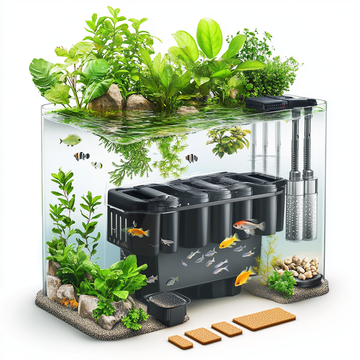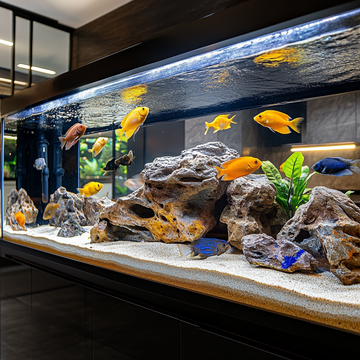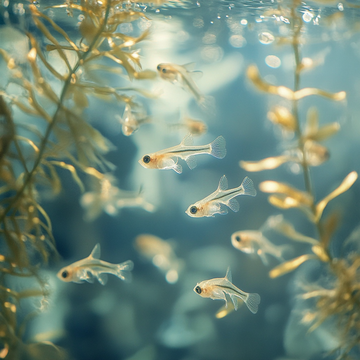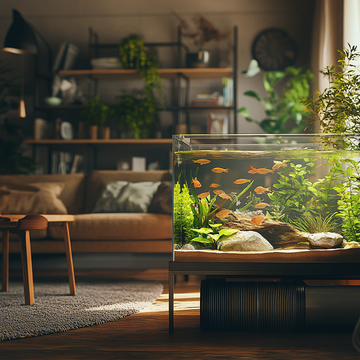At G.Valkyria, we understand that your aquarium is a world full of life and beauty that deserves the best care 🏞️💙. Whether you're new to fishkeeping or already experienced, you'll know that a good filtration system is essential to maintaining a healthy environment for your fish and aquatic plants. With so many types of filters available, it can be overwhelming to choose the right one. But don't worry! In this article, we'll walk you through the different types of aquarium water filters, their advantages and disadvantages, and help you decide which one is best for your freshwater aquarium. Let's start this aquatic adventure together! 🌊✨
Why is a Good Filtration System Important? 🧐
An aquarium filter is essential for:
- Keep water clean : Remove solid waste and chemical waste.
- Balance the ecosystem : It houses beneficial bacteria that break down toxic substances.
- Provide oxygenation : Promotes gas exchange and water movement.
- Improve the health of your fish : A clean environment reduces stress and disease.
Types of Water Filters for Aquariums 📋
1. Sponge Filters 🧽
Description :
- They consist of a sponge connected to an air pump.
- They perform mechanical and biological filtration.
Advantages :
- Economical and easy to install.
- Ideal for small or breeding aquariums .
- Safe for fry and shrimp as they do not suck them up.
Disadvantages :
- Limited filtration : They do not perform chemical filtration.
- Aesthetic : They can be conspicuous and take up space in the aquarium.
Recommended Use :
- Small aquariums (up to 40 liters).
- Breeding or quarantine tanks.
- Aquariums with species sensitive to strong flow.
2. Internal Filters 🚿
Description :
- They are placed inside the aquarium and usually adhere to the glass.
- They offer mechanical and sometimes biological and chemical filtration.
Advantages :
- Compact and easy to maintain.
- Economical and accessible.
Disadvantages :
- Space : They take up space inside the aquarium.
- Limited Capacity : Not suitable for large aquariums.
Recommended Use :
- Small to medium sized aquariums (up to 100 litres).
- Community aquariums with moderate biological load.
3. Backpack Filters (Hang-On-Back) 🎒
Description :
- They hang on the back edge of the aquarium.
- They perform mechanical, chemical and biological filtration.
Advantages :
- Versatile and easy to install.
- Easy access for maintenance.
- Good water flow and oxygenation.
Disadvantages :
- Limited Capacity : Not suitable for very large aquariums.
- Evaporation : They can increase water evaporation.
Recommended Use :
- Small to medium sized aquariums (up to 200 litres).
- Aquarists looking for ease of maintenance.
4. Canister Filters (External) 🛢️
Description :
- They are placed outside the aquarium and connected by tubes.
- They offer a wide capacity of filter media.
Advantages :
- High Efficiency : Excellent mechanical, chemical and biological filtration.
- Customizable : You can choose the filter media according to your needs.
- Aesthetic : They do not take up space inside the aquarium.
Disadvantages :
- Cost : More expensive than other types.
- Maintenance : May be more complex and requires space under the aquarium.
Recommended Use :
- Medium to large aquariums (from 100 liters onwards).
- Planted aquariums with high biological load.
- Aquarists looking for high quality filtration.
5. Sump Filters ⚙️
Description :
- Custom filtration system located in an additional tank below the aquarium.
- Provides space for additional equipment such as heaters and skimmers.
Advantages :
- Capacity : Large volume of filtration and oxygenation.
- Flexibility : You can add different types of filtration and equipment.
- Aesthetics : All equipment is hidden.
Disadvantages :
- Complex Installation : Requires knowledge and possibly modifications to the furniture.
- Cost : High initial investment.
Recommended Use :
- Large aquariums (more than 300 liters).
- Marine aquariums, although it is also useful in freshwater aquariums.
- Advanced aquarists who want a custom system.
6. Undergravel Filters 🌐
Description :
- Plates that are placed under the substrate and use an air pump or power head to move water through the substrate.
Advantages :
- Hidden and do not take up visible space.
- Simple and economical.
Disadvantages :
- Limited Efficiency : Basic mechanical and biological filtration.
- Difficult Maintenance : Accumulation of debris under the substrate.
- Not Compatible : With natural plants or fine substrates.
Recommended Use :
- Small aquariums without natural plants.
- Aquarists on a budget and with low biological load.
7. Fluidized Bed Filters 🌀
Description :
- They use suspended filter media to maximize biological surface area.
- Ideal for advanced biological filtration.
Advantages :
- High Biological Efficiency : Excellent for removing ammonia and nitrites.
- Compact and can be easily hidden.
Disadvantages :
- Without Mechanical or Chemical Filtration : They need to be complemented with other filters.
- Cost : They may be more expensive.
Recommended Use :
- Aquariums with high biological load.
- As a complement to other filtration systems.
8. Waterfall Filters (Wet/Dry) 🌊
Description :
- Water falls on filter media exposed to air, improving oxygenation.
- Common in marine aquariums and large freshwater systems.
Advantages :
- Excellent Biological Filtration : Thanks to high oxygenation.
- High Volume Capacity .
Disadvantages :
- Evaporation : Increases water loss.
- Noise : May be louder due to moving water.
Recommended Use :
- Large aquariums and systems with large or predatory fish.
- Aquarists who require robust biological filtration.
Which Filter is Best for Your Aquarium? 🐟
The choice of filter depends on:
- Aquarium Size : Larger aquariums require more powerful filters.
- Bioload : More fish or messy species need better filtration.
- Type of Species : Some species require specific conditions.
- Budget : Consider initial cost and maintenance.
- Experience Level : Some systems require more knowledge.
G.Valkyria Tip : It is always better to oversize your filtration than to undersize it. A good filter is an investment in the health and beauty of your aquarium 🐠💖.
Choosing the right filter is essential to maintaining a healthy and thriving aquarium 🌿💧. Each type of filter has its advantages and disadvantages, and the most important thing is to find the one that best suits you and your fish's needs. At G.Valkyria, we are committed to your success as an aquarist and want to help you create the best possible home for your aquatic friends. Don't hesitate to contact us for personalized advice! 🌟
Share your experience!
Do you have any favorite filters or tips on filtration systems? 🐟💬 Share with us in the comments and let's help other enthusiasts create healthy and successful aquariums!
We hope you find this article helpful! If you have any questions or need personalized advice, please feel free to contact us. At G.Valkyria, we are here for you and your wonderful aquatic pets 🐠💕.







